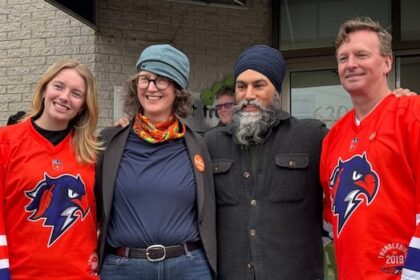British ColumbiaB.C.’s ombudsperson says more British Columbians are falling through the cracks when they try to access public services — a trend he warns could worsen as governments increasingly rely on artificial intelligence to make decisions. Ombudsperson’ office received over 17,500 people looking for help ‘navigating unfair public services’Shaurya Kshatri · CBC News · Posted: Nov 18, 2025 8:50 PM EST | Last Updated: 5 hours agoListen to this articleEstimated 4 minutesThe audio version of this article is generated by text-to-speech, a technology based on artificial intelligence.B.C. Ombudsperson Jay Chalke is highlighting the increasing role of artificial intelligence in government decision-making. He is seen here in 2017. (Chad Hipolito/The Canadian Press)B.C.’s ombudsperson says more British Columbians are falling through the cracks when they try to access public services — a trend he says could worsen as governments increasingly rely on artificial intelligence to make decisions.In his 2024–25 annual report released Tuesday, Ombudsperson Jay Chalke says his office received more than 7,300 complaints and inquiries last year, an increase of more than 350 from the year before.His office also heard from 17,500 people who said they struggled to navigate what they felt were unfair public services.“We’re seeing an emerging perfect storm,” Chalke said, adding that a large provincial deficit, affordability pressures, increased reliance on social supports and the growing use of AI all have created new risks for fairness.WATCH | Canada launches AI watchdog:Canada launches AI watchdog to oversee the technology’s safe development and useAmid rapid global advances and deployment of artificial intelligence technologies, the federal government has invested millions to combine the minds of three existing institutes into one that can keep an eye on potential dangers ahead.Growing use of AI in public decisionsChalke says communities are increasingly encountering automated or AI-assisted decisions — including in municipal building permits. “The good side is that AI can speed up processes, which people need,” he said. “However, if a decision is adverse to someone, we need a fair complaint process. Were humans in the loop? How was the decision made?”He said his office has been working to develop principles for AI use in the public sector and monitor how they’re being used across public services.“This isn’t a suggestion that AI shouldn’t be used,” he added. “But fairness must stay at the heart of it.”The Office of the Ombudsperson of B.C. released these statistics of their activity in 2024-25. (Office of the Ombudsperson of B.C.)Social supports and ICBC top complaint listThe report names the Ministry of Social Development and Poverty Reduction as the most complained-about public body in 2024-25, with 481 complaints, followed closely by ICBC with 476 and the Ministry of Children and Family Development with 408 complaints.There were also nearly a total of 500 inquiries and complaints made against municipalities last year. The City of Vancouver received 57 complaints, the most out of every other municipality followed by Victoria and Salmon Arm.Provincial bodies acknowledge the reportChalke says his office handled about 635 fairness or wrongdoing concerns each month — and more than a third of the complaints were related to housing, affordability and health care.Beyond numbers, the report also highlights several real-world cases that illustrate how administrative hurdles can escalate into crises for some people waiting to access services.One of the cases in the report on pediatric palliative care focuses on Darwyn Danesh, a teenager with complex medical needs who died in 2020. The ombudsperson found the co-ordination of his care across several ministries and health agencies was fragmented and unclear — leaving his parents without clear guidance about who was responsible for their son’s end-of-life care.Health Minister Josie Osborne says the province is working with Canuck Place Children’s Hospice and the Provincial Health Services Authority to improve clinician training and advance-care planning so “no child or family falls through the cracks again.” (Mike McArthur/CBC)The report says the case helped shape ongoing reforms in pediatric palliative care.B.C.’s Health Minister Josie Osborne took to social media following the report’s release, acknowledging government failures.“[The ombudsperson] report makes clear that the system failed Darwyn and his family,” Osborne wrote. “We acknowledge government’s role in those failures and the harm caused. Darwyn’s legacy must be a stronger, more responsive system that better serves people.”She said the province is working with Canuck Place Children’s Hospice and the Provincial Health Services Authority to improve clinician training and advance care planning so “no child or family falls through the cracks again.”Poverty Reduction Minister Sheila Malcolmson said the ministry has already made changes in response to the ombudsperson’s findings. (Chad Hipolito/The Canadian Press)Social Development and Poverty Reduction Minister Sheila Malcolmson also said the ministry has already made changes in response to the ombudsperson’s findings.“My ministry has already taken steps based on the [ombudsperson’s] recommendations: this includes faster responses through strengthened processes to triage urgent requests,” she said in a statement. Chalke’s annual review also renewed calls for public reports from his office to be automatically referred to a legislative committee for a hearing, which Chalke says would be practical and cost-effective.He also notes in the report that some public bodies act on his recommendations, while others “do not engage meaningfully or leave agreed-to actions unfinished.””A legislative committee hearing about our reports would help ensure accountability and transparency when public administration problems are identified.”ABOUT THE AUTHORShaurya Kshatri is a web writer and reporter at CBC News Vancouver. You can reach him at shaurya.kshatri@cbc.caWith files from Katie DeRosa and The Canadian Press
B.C. Ombudsperson’s annual report notes increasing role of AI in government decisions











